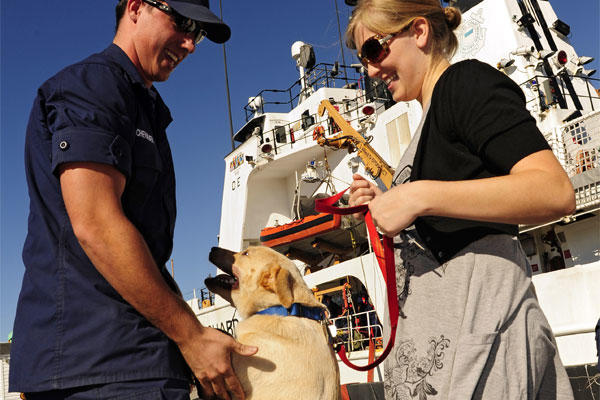The Re-deployment Stage
- Anticipation of homecoming
- Excitement
- Apprehension
- Burst of energy/"nesting"
- Difficulty making decisions
- Time frame: months five thru six
The re-deployment stage is generally one of intense anticipation. Like the deployment stage, there can be a surge of conflicting emotions. On the one hand, there is excitement that the Soldier is coming home. On the other, there is some apprehension. Some concerns include: "Will he (she) agree with the changes that I have made? Will I have to give up my independence? Will we get along?"
Ironically, even though the separation is almost over, there can be renewed difficulty in making decisions. This is due, in part, to increased attention to choices that the returning Soldier might make. Many spouses also experience a burst of energy during this stage. There is often a rush to complete "to-do" lists before their mate returns - especially around the home. It is almost inevitable that expectations will be high.
Post-deployment
- Honeymoon period
- Loss of independence
- Need for "own" space
- Renegotiating routines
- Reintegrating into Family
- Time frame: three to six months after deployment
The post-deployment stage begins with the arrival to home station. Like the pre-deployment stage, the timeframe for this stage is also variable depending on the particular Family. Typically, this stage lasts from three to six months.
This stage starts with the "homecoming" of the deployed Soldier. This can be a wonderfully joyous occasion with children rushing to the returning parent followed by the warm embrace and kiss of the reunited couple. The unit then comes to attention for one last time, followed by words of praise from the senior commander present. Lastly, weapons are turned in and duffle bags retrieved and the Family goes home.
Homecoming can also be an extremely frustrating and upsetting experience. The date of return may change repeatedly or units may travel home piece-meal over several days. Despite best intentions, the spouse at home may not be able to meet the returning Soldier (short notice, the children might be sick, sitters cannot be found in the middle of the night, unable to get off work, etc.). Soldiers may expect to be received as "heroes" and "heroines" only to find that they have to make their own way home.
Typically, a "honeymoon" period follows in which couples reunite physically, but not necessarily emotionally. Some spouses express a sense of awkwardness in addition to excitement: "Who is this stranger in my bed?" For others, however, the desire for sexual intimacy may require time in order to reconnect emotionally first.
Eventually, Soldiers will want to reassert their role as a member of the Family, which can lead to tension. This is an essential task, which requires considerable patience to accomplish successfully. Soldiers may feel pressure to make up for lost time and missed milestones. Soldiers may want to take back all the responsibilities they had before. However, some things will have changed in their absence: spouses are more autonomous, children have grown, and individual personal priorities in life may be different. It is not realistic to return home and expect everything to be the same as before the deployment.
During this period, spouses may report a lost sense of independence. There may be resentment at having been "abandoned" for six months or more. Spouses may consider themselves to be the true heroes (watching the house, children, paying bills, etc.) while Soldiers cared only for themselves. At least one study (Zeff et. al., 1997) suggests that the stay-at-home parent is more likely to report distress than the deployed Soldier. Spouses will also have to adapt to changes. Spouses may find that they are more irritable with their mates underfoot. They may desire their "own" space. Basic household chores and routines need to be renegotiated. The role played by the spouse in the marriage must be reestablished.
Reunion with children can also be a challenge. Their feelings tend to depend on their age and understanding of why the Soldier was gone. Babies less than 1 year old may not know the Soldier and cry when held. Toddlers (1-3 years) may be slow to warm up. Pre-schoolers (3-6 years) may feel guilty and scared over the separation. School age children (6-12 years) may want a lot of attention. Teenagers (13-18 years) may be moody and may not appear to care. In addition, children are often loyal to the parent that remains behind and do not respond to discipline from the returning Soldier. They may also fear the Soldier's return: "Wait till Mommy/Daddy gets home!" Some children may display significant anxiety up to a year later ("anniversary reaction"), triggered by the possibility of separation. In addition, the Soldier may not approve of privileges granted to children by the non-deployed parent. However, it is probably best for the Soldier not to try to make changes right away and to take time renegotiating Family rules and norms. Not heeding this advice, the Soldier risks invalidating the efforts of his/her mate and alienating the children. Soldiers may feel hurt in response to such a lukewarm reception. Clearly going slow and letting the child(ren) set the pace goes a long way towards a successful reunion.
Post-deployment is probably the most important stage for both Soldier and spouse. Patient communication, going slow, lowering expectations and taking time to get to know each other again is critical to the task of successful reintegration of the Soldier back into the Family. Counseling may be required in the event that the Soldier is injured or returns as a stress casualty. On the other hand, the separation of deployment - unlike civilian couples - provides Soldier and spouse a chance to evaluate changes within themselves and what direction they want their marriage to take. Although a difficult as well as joyful stage, many military couples have reported that their relationship is much stronger as a result.





















